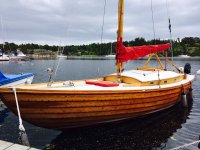folkboat49
Member
- Joined
- Jul 2, 2021
- Messages
- 2
I'm in the process of restoring a 25 ft wooden sailboat and the first task is stripping the paint. Currently using a heat gun and scraper but thinking a Festool sander might be a better / faster method. Plus I'll be able to use the sander for other tasks beyond paint / varnish stripping. The exposed planking width is 4-4.25 inches so thinking the RO 90 might be the best bet and it also has the triangular sanding pads for detail work which will also be beneficial.
Question: Will the RO90 be the best choice? Will it have the strength / power to remove material such as below water line anti-fouling paint etc. My original though was the RO150, but its cost along with a CT26 E Extractor has me rethinking my purchase.
Any thoughts will be appreciated.
Question: Will the RO90 be the best choice? Will it have the strength / power to remove material such as below water line anti-fouling paint etc. My original though was the RO150, but its cost along with a CT26 E Extractor has me rethinking my purchase.
Any thoughts will be appreciated.


